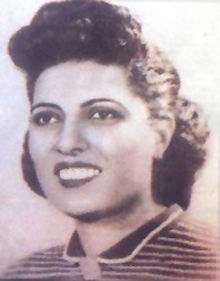Samira Musa
Samira Musa ( Arabic سميرة موسى, DMG Samīra Mūsā , English transcription Sameera Moussa ; born March 3, 1917 in al-Gharbiyya Governorate , Egypt ; died August 5, 1952 in California ) was an Egyptian nuclear physicist who was committed to ensuring that the medical use of nuclear technology should be accessible to all.
Life
All life descriptions in Western media are based on a presentation of their curriculum vitae on the homepage of the Egyptian State Information Service , which was later revised and shortened.
After that, Musa's father was a well-known political activist. After Samira Musa's mother died from cancer , he moved to Cairo with his daughter and invested his money in a small hotel. After elementary school, Musa attended the Banat El-Ashraf School, which was built and run by the well-known activist Nabawya Musa (not related to her).
Because of her school grades, Musa could have studied engineering. Instead, she chose to study at Cairo University's science faculty . In 1939 she graduated (Bachelor of Science) with top marks in radiology after studying the effects of X-rays on various materials. She then became an assistant teacher and, due to her skills, finally became an assistant professor at the same university. She was the first woman to hold such a position at an Egyptian university. She did her PhD on nuclear radiation and continued her research in England .
Musa advocated the medical use of nuclear radiation. She described her goal with the words “My wish is to make radiation treatment as available and cheap as aspirin .” As part of her research, she developed an approach that allowed the atoms of cheaper metals such as copper to be broken down. She also volunteered to treat cancer patients at various hospitals, something she was particularly motivated to do by her mother's cancer death.
Musa organized the conference "Atomic Energy for Peace" and supported a call for an international conference under the motto "Atoms for Peace", to which numerous prominent scientists were invited. The conference developed a series of recommendations to set up a committee on protection against nuclear threats, to which Musa was strongly committed.
A scholarship from the US Fulbright Program enabled Musa to conduct research at California University . Because of her research achievements, she was allowed to visit secret nuclear research facilities. Her visit sparked a heated debate in the American scientific community as Musa was the first foreigner to enter these facilities. She turned down several job offers because she would have had to stay in the United States. Instead, she wanted to return to Egypt.
At the end of her stay in the US, she was invited on a trip during which she was killed in a car accident. There are rumors surrounding this accident. It is rumored that a Jewish-Egyptian actress was behind the murder of Musa on behalf of the Israeli Mossad, which also led to upheavals in the Egyptian presidential election campaign in 2012.
Reception and appreciations
After her death, Musa received numerous honors and appreciations in Egypt:
- 1953 Awarded by the Egyptian Army
- 1981 Awarded the Order of Science and Arts, First Class, by President Anwar Sadat
- Egyptian television broadcast a series about her life.
- On Egyptian Women's Day in 1998 it was decided that a cultural site named after her should be set up at her place of birth.
As a result of the publication of her biography on the homepage of the State Information Service , Musa also became known in Western countries and, despite the meager sources, she was often highlighted as an exemplary scientist - from Ignite (A Global Fund for Women) to Physics Today .
Web links
- Sameera Moussa (March 3, 1917 - August 5, 1952) . In: State Information Service. Your Gateway to Egypt . December 24, 2015 ( gov.eg [accessed April 14, 2018]). Earlier, more comprehensive version: Sameera Moussa (March 3, 1917 - August 5, 1952). In: State Information Service. Your Gateway to Egypt. July 20, 2009 ( memento of April 23, 2016 in the Internet Archive ) (accessed via web archive on April 14, 2018).
Individual evidence
- ↑ a b Sameera Moussa (March 3, 1917 - August 5, 1952) . In: State Information Service. Your Gateway to Egypt . December 24, 2015 ( gov.eg [accessed April 14, 2018]).
- ↑ Sameera Moussa (March 3, 1917 - August 5, 1952). In: State Information Service. Your Gateway to Egypt. July 20, 2009 ( memento of April 23, 2016 in the Internet Archive ) (accessed via web archive on April 14, 2018).
- ↑ Zvi Bar'el: As Egypt Elections Near, One Candidate Faces the Worst Accusation - Jew . In: Haaretz . April 11, 2012 ( Haaretz.com [accessed April 14, 2018]).
- ^ Al-Masry Al-Youm: Raqia Ibrahim: Egyptian Jewish actress recruited by Israel to prevent Egypt owning nuclear bomb - Egypt Independent . In: Egypt Independent . December 1, 2014 ( egyptindependent.com [accessed April 14, 2018]).
- ↑ Sameera Moussa. Nuclear scientist, Egypt. Dedicated her life to making nuclear technology accessible for medical use. Accessed April 14, 2018 .
- ^ Sameera Moussa: World-renowned Egyptian Nuclear Scientist . In: African Heritage . August 6, 2012 ( afrolegends.com [accessed April 14, 2018]).
- ^ Salma: Sameera Moussa. In: My Hero. May 20, 2014, accessed April 14, 2018 .
- ↑ Sameera Moussa . In: Physics Today . March 3, 2017 ( scitation.org [accessed April 14, 2018]).
- ↑ Women in Industry: Sameera Moussa | CK Technical. Retrieved April 14, 2018 (UK English).
| personal data | |
|---|---|
| SURNAME | Musa, Samira |
| ALTERNATIVE NAMES | Moussa, Sameera; سميرة موسى |
| BRIEF DESCRIPTION | Egyptian nuclear physicist |
| DATE OF BIRTH | March 3, 1917 |
| PLACE OF BIRTH | Al-Gharbiyya Governorate , Egypt |
| DATE OF DEATH | 5th August 1952 |
| Place of death | California |
